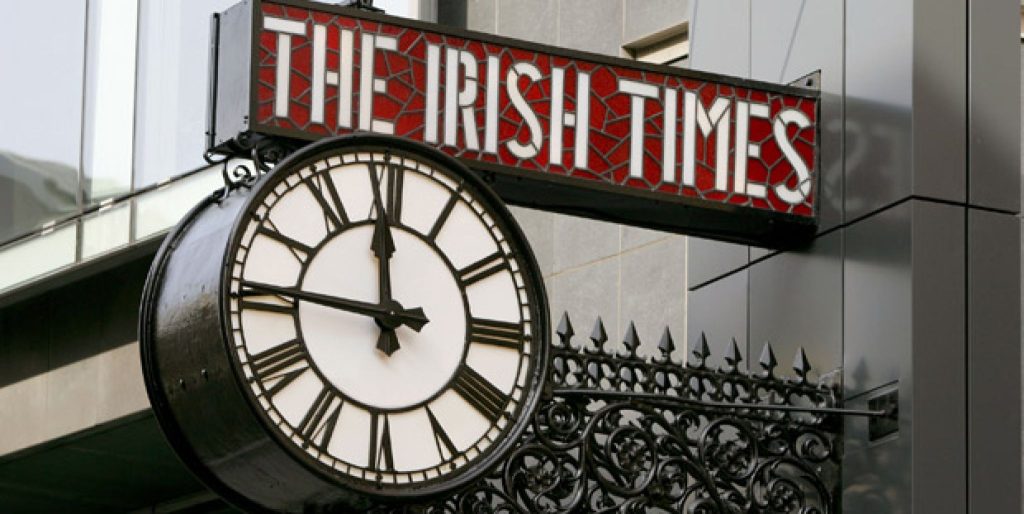
by Lev Tsitrin
“Biden Loves Ireland. It Doesn’t Love Him Back” Una Mullally, a columnist for The Irish Times informs us in her New York Times’ “guest essay.”
What caused the end of the romance? Ireland broke it off because, as Ms. Mullally tells us, “After Hamas’s attacks, the Israeli bombardment of Gaza appalled the Irish. Mr. Biden, as the leader of Israel’s closest ally and chief military supplier, was seen to be enabling the devastation. That complicity has damaged both his reputation and his relationship with the Irish people, perhaps irreparably.”
And why were the Irish “appalled”? “Here in Britain’s first colony — a status cast off through a war of independence — empathy for Palestinians is deeply rooted, born of shared historical experience.”
I am sorry Ms. Mullally, but your “explanation” is bonkers. It puts history on its head, and reveals your monumental ignorance.
Let’s talk “shared historical experience,” Ms. Mullally. If you learned the smattering of history, you would have known that the Irish experience is similar to that of the Jews — while the Arab experience is the carbon-copy of that of the British. The Arabs were the Empire in the 7th century AD when, in order to spread what they saw as “civilization,” they went on a spree of conquests, taking over the half of the then-known world — from Spain and Sicily in the West, through North Africa, all the way to India in the East, replacing or subduing the “backward” and “barbaric” indigenous cultures and religions (Judaism and Christianity including) with Islam, the tiny speck of Palestine that was a Jewish homeland for millennia being among the first thus swallowed.
Rings a bell, Ms. Mullally? Doesn’t it remind you of something — let me give you a hint — say, of the British Empire? And of Ireland, among many other places around the globe?
And doesn’t the blow-back that followed this initial wave of conquests — Spain’s reconquista by the Franks, taking of Sicily by the Normans, and — closer to our time — the Zionist project that gave half of the Palestine that is Jewish ancestral home back to the Jews, remind you of — does the bell go off in your head, Ms. Mullally? — the Irish struggle for independence from the Brits?
Apparently not. The Palestinian insistence that Arabs are the indigenous inhabitants of the land their ancestors conquered in a burst of imperialism, rather than the Jews who inhabited it for millennia before the Arabs, that there was never a Jewish state in Palestine, that there was never a temple in Jerusalem, that Jews never lived there — but that they are a foreign implant, the invaders from the outside, the equivalent of the imperialistic, settler-colonial Brits taking over the Arab equivalent of the native Irish land, had been thoroughly absorbed by the likes of Ms. Mullally. Hence, to her and her ilk, Israel’s self-defense is aggression — the illegitimate empire refusing to shrink and disappear.
Unfortunately, she is not alone in her utter ignorance. As she herself observes, “Ireland is something of an outlier in Europe. In a January poll, 71 percent of respondents in Ireland said they believed Palestinians lived under an Israeli apartheid system; in another poll in February, 79 percent said they believed Israel was committing genocide. By contrast, no more than 27 percent of people in seven Western European countries said they sympathized more with Palestinians than with Israelis.”
The reason for this “outlier” condition is rather simple: unlike other Western countries like the US, in Ireland the anti-Israel feeling is not something that swells up from the Islamists and the “progressives” who try to spread it to the other citizens, and through them pressure the government to change its Israel policy. In Ireland, it seems to start with the government which pushes it down upon the masses, encouraging it — or at the very least, not discouraging it. In the absence of the push-back from the higher-ups. today’s Ireland looks like the scene from Chaplin’s The Great Dictator in which the Jewish hairdresser awakes from his WW1-induced amnesia to find himself in the Third Reich — and, having observed the abuse of the Jews, calls the police. What ensues, is a civilizational misunderstanding — in the eyes of the Jewish hairdresser the police fails to do its duty when it condones the abuse. In the eyes of the police, there is no abuse — when it comes to a Jew, the term simply does not apply.
Given the resulting license to bash Israel, the unchecked orgy of anti-Israeli sentiment which Ms. Mullally describes with the innocent naivety of a Nazi policeman in a Chaplin movie as something obviously proper, and to be proud of, is not surprising — “countless concerts, fund-raisers and demonstrations calling for a cease-fire and an end to the bombardment of Gaza [that go] far beyond any fringe concern. Protests in Ireland are large and spread across the country, with attendees diverse in age, class, ethnicity and political affiliation. They bring together trade unionists, Gaelic football players, journalists, ordinary citizens young and old, politicians, health care workers, L.G.B.T.Q. people and many more. It is a truly national phenomenon.”
This is sad. Ireland seems to have stopped thinking. While it should be duly noted that 30% of the Irish have not succumbed to this mass hysteria, the anti-Israelism in Ireland which Ms. Mullally proudly calls “national phenomenon” is really a national disgrace.
It is a disgrace caused by ignorance — and it is not something to be proud of, not something to show off on the pages of the New York Times (or Ms. Mullally’s own The Irish Times, for that matter). This is not Ireland’s “finest hour.” Very, very far from it, indeed…








One Response
Indeed. Well argued.